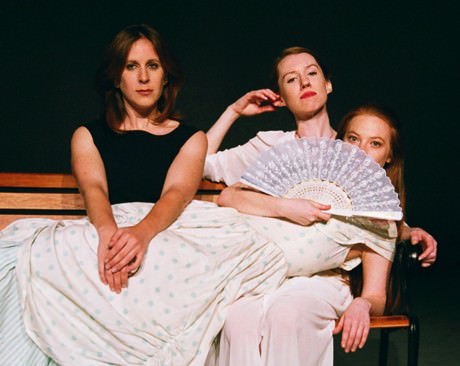Triptych Productions’ The Confines of Flattery comprises three one-act plays, representing three different eras and styles. The connective tissue running through them is suggested by the production’s title, which comes from a line in one of the three plays, Moliere’s “The Pretentious Young Ladies.”
“You carry your civilities to the utterest confines of flattery,” says one such young lady, demonstrating impressive fawning skills of her own. What makes the phrase, and the title, so clever is the dual connotation of the word “confines.” On the surface, it seems to mean the pinnacle of achievement in the art of buttering up. But it also points to the limits of flattery as a strategy for achieving one’s ends.

Each of the three founders of Triptych directs one of the three plays: Heather Benjamin: “The Pretentious Young Ladies” by Moliere; Julia Morrissey: “A Matter of Husbands” by Ferenc Molnar’; and Lizzi Albert: “Mamet Women” by Frederick Stroppel.
I recently had the opportunity to sit in on a rehearsal for what I expect to be a very funny and thought provoking show. Afterward, I spoke with the three principals. What follows are excerpts from our conversation.
On Play Selection
Lizzi Albert: Among other things we brought to the table, Heather suggested the Moliere play and Julia brought “Mamet Women.” And then somebody said, “What if we paired those two together?”
Julia Morrissey: I had this moment of, “Is that crazy? Do these plays go together?”
Lizzi: Yeah, you said it, but I had been thinking it secretly, and I don’t know why I didn’t say it, because then I could take credit now.
Julia: (Whispering to the reporter) Give me all the credit.
Lizzi: And Heather said, “Well, I have this other play [the Molnar] that I hadn’t even proposed that might be a good fit with them.”
Julia: All of a sudden we had these three plays that had two women as their central characters and the idea of women behaving out of the norm. The plays are completely different in style, but there is a consistent theme and they’re all laugh-out-loud funny.
“The Pretentious Young Ladies“
Heather Benjamin: The setup is that these young girls come from the country to Paris and are anxious to drink in the cultured, artistic, fashionable world that is Paris, and they’re looking for suitable suitors.
Julia: Which to them means men directly out of the romantic novels of the day.
Lizzi: I love the one scene where the guy gets carried away with his own pretensions. He’s reading a poem he’s made up and he’s like, “You hear these words? They’re so brilliant!” And the girls are going, “Yes! Yes!”
Heather: Yeah, it’s a dual thing for his character because he is playing a trick on them, but he’s also enjoying himself hugely because he does think himself a cut above the other guys.
Lizzi: A secret genius, yeah. The whole play is really funny.
“A Matter of Husbands“
Julia: The characters are the Famous Actress (Heather) and the Earnest Young Woman (Kelsey Meiklejohn), and the Earnest Young Woman who’s certain the actress is having an affair with her husband.
Lizzi: The play was written in the 20s, but it reminds me of movies from the 30s and 40s. There was a kind of capable femininity in those movies that was celebrated.
Heather: That’s a very good point about period drama. From the 20s to the 40s women characters were so much stronger and less neurotic than in contemporary plays.
Lizzi: There’s no modern Katherine Hepburn.
Heather: No.
Lizzi: Let alone Bette Davis.
Heather: The femininity is part of the power.
Lizzi: Right. It’s not a corset. You wear it on top and you have all this freedom to move about doing what you’re doing.
“Mamet Women“
Lizzi: Mamet Women is a parody of David Mamet’s plays by Frederick Stroppel. Polly’s babysitter cancels at the last minute. So her friend Sally offers to step in. But there’s a catch.
Julia: The particular style of Mamet, usually set in a very male-centric world, becomes immediately funny when you put women into it. And then of course Mamet is not particularly known for his love of women.
Heather: I take exception; I think Mamet writes great women. I think they’re a lot of fun. They’re powerful. They’re aggressive. They’re always pursuing a very strong objective. Oftentimes they’re villains, but that’s not the same as hating women.
Julia: But do you agree that there’s a general consensus that he’s not the biggest fan of women?
Heather: I know that’s the consensus; I just don’t personally agree with it.
Julia: But whether it’s actually true or not, in terms of parody, it’s the perception, and to take his style and put women into it adds to the comedy.
If you’d like to see talented actors performing three diverse, intelligent, and funny plays, don’t miss The Confines of Flattery. It’s sure to be a highlight of this year’s festival.

Venue:
Fort Fringe – Redrum – 612 L Street NW in Washington, DC
Performances:
Purchase tickets by clicking on the performance you want to see or go The Confines of Flattery Capital Fringe show page:
Jul 13th 8:30 PM
Jul 14th 11:15 PM
Jul 19th 6:15 PM
Jul 21st 3:45 PM
Jul 22nd 2:15 PM
Jul 29th 6:45 PM
LINK:
Triptych Productions’ website.




